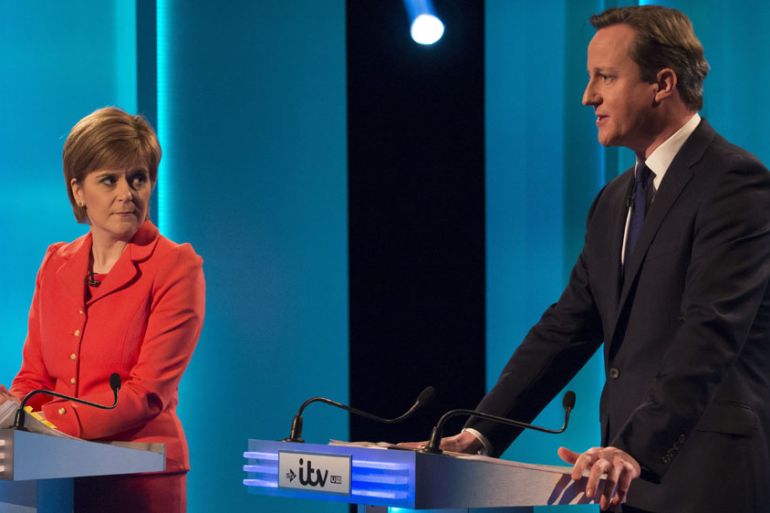UK multi-party debates: No empty chairs
Cameron plays political game of chicken with broadcasters to hold multi-party debates

With all the adulation being heaped on Scottish National Party leader Nicola Sturgeon following her performance in the televised UK election debate, it’s hard to imagine now that if the country’s main broadcasters had stuck to their original intentions, she wouldn’t have been there at all.
In those plans revealed by the BBC, ITN and Sky last autumn, all the three ladies who did end up participating in the debates would have been left out – Sturgeon, plus Leanne Wood of Plaid Cymru and Natalie Bennett of the Greens.
Keep reading
list of 4 itemsFull jury panel seated on third day of Trump’s New York hush-money trial
Jacob Zuma’s nine lives: How South Africa’s ex-president keeps coming back
A flash flood and a quiet sale highlight India’s Sikkim’s hydro problems
There were threats of legal challenges from excluded parties, but oddly it was the Conservative Party’s leader, David Cameron, who dug his heels in saying that if the Greens were excluded, he would not participate.
Sturgeon’s standout moments were when she took on Farage of right-wing UKIP on immigration and advanced her belief in the principle of free university education. These views are rarely heard in mainstream media debate in the UK.
Pro-immigration stances were also taken up vociferously by Bennett and Wood, and they made arguments for public spending increases rather than upholding the traditional orthodoxy of who can implement austerity in the fairest way.
I’m pleased to say that Al Jazeera was ahead of the curve last year in feeling that the debate should be more inclusive. The network was actively looking at hosting a debate if the domestic broadcasters failed to get their act together. AJE is on all the main UK platforms, including Freeview, Sky and Virgin.
Cameron’s game of chicken
With the “major” parties polling at the lowest share of the vote in recent history, it’s right that the debate reflected the wider tenor of sentiment in the UK.
David Cameron was on cruise control during the debate itself, but he had already played a blinder with regard to his own agenda before it got to that point.
His initial refusal to take part in the debate if the Greens were not included led to threats from the broadcasters to “empty-chair” him if he didn’t accept their proposals.
The threats proved hollow though, and in the end the channels relented by including more parties, and also all but accepting his demand to hold the debate before the official election campaign began – it was held just three days after the dissolution of parliament.
Gone are the second and third debates in the “4-3-2” formation that the broadcasters wanted in the build up to polling day. A debate with four parties was to be followed by three, and then a head-to-head between the leaders of the two largest parties.
This is in many ways an unsurprising result – anyone playing politics with professional politicians risks coming-off second best. The TV channels blinked first. They cannot do the same at the next election and would be well advised to vest the powers to organise a debate into an independent body as some have suggested.
This has left Labour in a curious position. Cameron, while successful playing chicken with the broadcasters, has effectively ducked out of a debate with his main challenger to be prime minister, Ed Miliband.
Some wonder why he would have done so – he is an able performer and wasn’t terribly ruffled during the 7-way debate despite the challenge of having to defend a record of austerity in government.
For their part, Labour doesn’t appear to want to capitalise on this possible weakness.
Some parties would be going to town on this. Miliband could for example take two podiums wherever he speaks in the country, one for him and one for the conservative leader who didn’t turn up.
Rather than selling “Controls on immigration” mugs, Labour supporters could be armed with models of empty chairs to wave around. Maybe they believe the debates aren’t so influential after all, but they could be as important as they wish them to be.
Osama Saeed is head of public and media relations at Al Jazeera English. He ran for parliament as a Scottish National Party candidate in the UK’s 2010 general election.